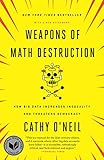All Categories
Automating Inequality: How High-Tech Tools Profile, Police, and Punish the Poor
Share Tweet
*Price and Stocks may change without prior notice
*Packaging of actual item may differ from photo shown
- Electrical items MAY be 110 volts.
- 7 Day Return Policy
- All products are genuine and original
- Cash On Delivery/Cash Upon Pickup Available








About Automating Inequality: How High-Tech Tools
About the Author Virginia Eubanksis an Associate Professor of Political Science at the University at Albany, SUNY. She is the author of Digital Dead End: Fighting for Social Justice in the Information Age and co-editor, with Alethia Jones, of Ain’t Gonna Let Nobody Turn Me Around: Forty Years of Movement Building with Barbara Smith. Her writing about technology and social justice has appeared in Scientific American, The Nation, Harper’s, and Wired. For two decades, Eubanks has worked in community technology and economic justice movements. She lives in Troy, NY. Product Description WINNER: The 2019 Lillian Smith Book Award, 2018 McGannon Center Book Prize, and shortlisted for the Goddard Riverside Stephan Russo Book Prize for Social Justice Astra Taylor, author of The People's Platform: "The single most important book about technology you will read this year." Dorothy Roberts, author of Killing the Black Body: "A must-read." A powerful investigative look at data-based discrimination?and how technology affects civil and human rights and economic equity The State of Indiana denies one million applications for healthcare, foodstamps and cash benefits in three years―because a new computer system interprets any mistake as “failure to cooperate.” In Los Angeles, an algorithm calculates the comparative vulnerability of tens of thousands of homeless people in order to prioritize them for an inadequate pool of housing resources. In Pittsburgh, a child welfare agency uses a statistical model to try to predict which children might be future victims of abuse or neglect. Since the dawn of the digital age, decision-making in finance, employment, politics, health and human services has undergone revolutionary change. Today, automated systems―rather than humans―control which neighborhoods get policed, which families attain needed resources, and who is investigated for fraud. While we all live under this new regime of data, the most invasive and punitive systems are aimed at the poor. In Automating Inequality, Virginia Eubanks systematically investigates the impacts of data mining, policy algorithms, and predictive risk models on poor and working-class people in America. The book is full of heart-wrenching and eye-opening stories, from a woman in Indiana whose benefits are literally cut off as she lays dying to a family in Pennsylvania in daily fear of losing their daughter because they fit a certain statistical profile. The U.S. has always used its most cutting-edge science and technology to contain, investigate, discipline and punish the destitute. Like the county poorhouse and scientific charity before them, digital tracking and automated decision-making hide poverty from the middle-class public and give the nation the ethical distance it needs to make inhumane choices: which families get food and which starve, who has housing and who remains homeless, and which families are broken up by the state. In the process, they weaken democracy and betray our most cherished national values. This deeply researched and passionate book could not be more timely. Review ONE OF Vox's 12 GREAT SOCIAL SCIENCE BOOKS OF THE 2010's "This is a rigorous, compelling piece of qualitative social science and one of the best-crafted nonfiction books I’ve ever read, period. As a journalist, it made me actively envious of its prose.... a reminder of what can go awry when politicians mistake technical solutions for political solutions." ―Dylan Matthews, Vox "Required reading for the modern age, Automating Inequality explains through beautifully rendered individual stories and deeply researched historical analysis why we must remain vigilant and skeptical of the promises of artificial intelligence fed to us by those who stand to gain from their adoption." ―Cathy O'Neil, New York Times bestselling author of Weapons of Math Destruction "[Automating Inequality's] argument is that the use of automated decision-making in social service programs creates a "digit



















